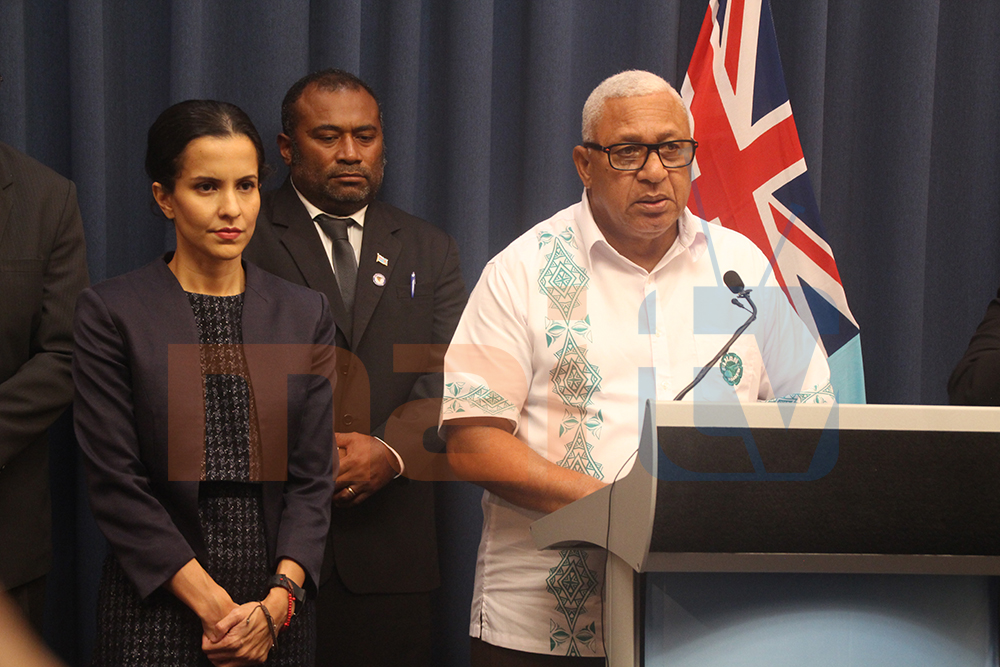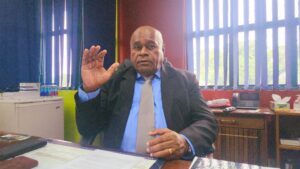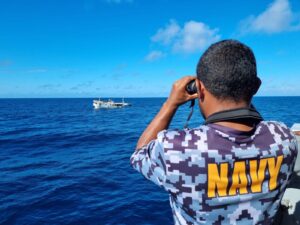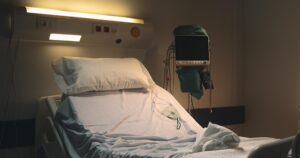As announced Saturday, our first two COVID-19 patients remain in isolation and both are in stable condition.
As I’ve already explained in great detail, once we confirmed our first COVID-19 case, we immediately identified and isolated eleven members of the first patient’s household at our Western Division isolation ward at Nadi Hospital. These individuals were transported in a secure and hygienic fashion and had zero contact with any person in Nadi or anywhere outside the Lautoka confined area. All eleven household members remain in isolation.
Our second confirmed case was the patient’s mother. Following results of our testing, Today, the 23rd of March, we can confirm that the patient’s one-year old nephew has also contracted the virus. Luckily, once again, this patient was not showing symptoms until they were in isolation, vastly cutting the odds they passed the virus onto others.
This is the third confirmed case of COVID-19 in Fiji.
Bainimarama
The mortality rate among the young is especially low –– around the world, coronavirus has largely gone undetected in children and infants, as they display only mild symptoms. But as today’s case shows, no age group or demographic is immune to contracting or spreading the virus.
So while today’s case may seem heartbreaking, what is truly frightening is the scenario that could have unfolded if the situation had been handled differently, and our first patient’s entire household wasn’t immediately put into isolation as soon as he tested positive.
Every grandparent, great-grandparent, uncle, auntie and neighbour who held this precious, fourteen-month old baby boy in their arms could have easily been infected, all with just a drop of spittle, burp, or cough. And while statistics show that babies will recover, for the more vulnerable in our society, this simple act of affection could be a death sentence.
By the grace of God, our aggressive contact tracing exercise has so far proven very effective, identifying two additional patients who were already safely placed in isolation. But to continue to successfully trace any and all contacts of our first patient, we need your help.
Our first patient worked as a flight attendant. Through our contact tracing, our teams immediately began identifying all individuals who potentially came into contact with the patient during his servicing of three different flights: FJ 411 from Nadi to Auckland, FJ 410 from Auckland to Nadi and FJ 871 from San Francisco to Nadi.
Working with Fiji Airways, our team was able to quickly identify every passenger and potential point of contact on those flights. We have their names and locations. Of the 359 passengers and crew, 277 have been contacted and have since either left the country or entered self-quarantine in Fiji. They will be tested if they begin to display symptoms.
Meanwhile, 82 passengers have yet to come forward, despite repeated attempts to contact them.
While some may have left the country, it is vital we get all of these people accounted for. At the moment, they pose an unacceptable risk –– so we are enlisting your help to track them down.
The Ministry of Health and Medical services has published a list of the names and locations on its Facebook page of all individuals on these flights who need to immediately self-quarantine. Every Fijian should read it carefully. If you know one of these individuals, tell them to call 221 9906 immediately –– our containment efforts depend on each of these individuals making contact with the Ministry of Health and Medical Services.
Because while these passengers’ interaction with our first patient may have been extremely brief –– especially compared to the intimacy of a twelve-person household –– we must exercise an abundance of caution, and extinguish absolutely any chance of COVID-19 spreading further.
If any of these people are infected, even if they appear healthy, they could easily infect anyone they interact with and start an outbreak that spreads and spreads and spreads across the entire country. That is why all of us, everywhere in Fiji, need to recognise we’re at risk and adhere closely to every measure of protection we’ve put in place.
Until we can trace each and every one of these passengers –– all Fijians, wherever they reside, should stay home as much as possible and limit all non-essential travel. Go straight to work, and come straight home.
Restaurant owners should cut their seating capacity to be within our 20-person limit, keep tables hygienic and safely spaced apart, and –– better yet –– switch to delivery. For those who already offer take-away or delivery, do it more. For all others, try offering this service for the first time.
So whether you’re a restaurant owner, a taxi driver, or operate any business that involves customer turnover and shared spaces, do your business as safely as possible. Sanitise your kitchens and vehicles, cancel any mass gatherings, and lead our country by example. Because if you can’t operate safely, you won’t operate at all.
My fellow Fijians, the border protection measures in the Lautoka confined area remain in full effect. The Fiji Police are monitoring checkpoints at the King’s Road at Matuwalu Junction, the feeder road at Vakabuli Junction and the Queen’s Road at Natalau Junction.
International shipping services to the Lautoka port are all diverted to Suva except for those that deliver goods exclusively for food and manufacturing purposes only for the Lautoka confined area. Details about who qualifies for this exemption are published on the Fijian Government website. The Commissioner for Police will be overseeing the safe and hygienic off and on-loading of all goods into Lautoka, and he is the main contact for the exporters and importers who qualify.
If anyone thinks our measures in the Lautoka confined area are tough, you haven’t been paying attention to what’s being enforced around the world in places where the spread of COVID-19 has gotten out of control. Entire countries in Europe are shut down, with every citizen ordered to stay at home. Every non-life-saving business is shuttered. As recently as today, our neighbours in Australia and New Zealand have been forced to take this heavy-handed action –– a path we are not afraid to follow if and when the need arises. Fijians must adhere to our advice now, or the controlled freedom that’s currently being taken for granted won’t last.
I know our border control measures aren’t convenient for everyone, but prioritising convenience won’t save lives. These measures are strict, they are necessary, they have been proven to work around the world, and that is all that matters.
Everywhere in Fiji, we need to do better. We’ve announced a ban on any gatherings of 20 or more people. Workplaces, banks, supermarkets, open-air markets, pharmacies and other areas where essential services are offered are okay for now, given you keep a safe distance apart. But this ban applies to weddings, parties, concerts, sports events, religious services, funerals –– everything, no exceptions. None of these plans are more important than people’s lives. You may live outside of Lautoka, or outside of Viti Levu, and feel that you can still gather and celebrate, safe from harm. This mentality is stupid, as you’re harming yourself. It is destructive, as you’re putting the integrity of our containment measures in jeopardy. And it is selfish, as you are putting the lives of others at risk.
It’s also unfortunate to see that a number of individuals have already sought to violate our border protection measures. So far, 11 have been charged and produced in court today. In the last few hours, another three have been arrested.
I was shocked to learn that the Vice-Chancellor of the University of Fiji illegally violated the Lautoka confined area and caught a flight to Sydney.
Bainimarama
Imagine the ordinary Fijians should have come into contact with her on her way to Nadi, through Nadi airport and on the plane itself. Her crimes put lives at-risk and are an affront to the hard work of our officers and staff, as well as the good measures we’ve put in place to protect our people.
So, if you’re planning to illegally enter or leave the confined area, or aid and abet someone seeking to do so, think again. This isn’t a game. This is a life or death situation, and punishments will match the seriousness of the offences committed.
While the borders are closed, we’re going to tremendous lengths to ensure life in the Lautoka confined area goes on normally as much as possible. Banks, pharmacies and supermarkets all remain open. Food is being regularly supplied. Essential services are being provided.
We’re maintaining the current borders of the Lautoka confined area for the time being. But if people continue to break the law and leave or enter, we will not have a choice – these restrictions will need to be prolonged and extended to new areas or even the entire country. Please keep this in mind, it’s on all of us to keep this virus contained.
And while I’ve been disappointed to see a few bad apples, skirting the rules and recommendations we’ve enacted to keep Fiji safe, I’ve also been incredibly heartened by the nationwide response to look out for each other’s health and wellbeing. There are stories of young people doing grocery shopping for their elderly neighbours. Stories of hotels opening their doors, free of charge, to those who are restricted from entering the confinement area. Stories of Fijians spreading love on social media, finding new ways to greet each other, and reminding their friends to spread facts, not fear.
We should all be grateful to our disciplined forces for their vigilance in keeping Fijians from harm, but our officers cannot be everywhere at once. We need every Fijian enlisted in our enforcement effort. If you see a large gathering going on, tell them to show some care and cancel it.
Bainimarama
If you know someone is planning to leave the Lautoka confined area, immediately tell the Police. If you see someone violating self-quarantine, tell them to take themselves home for the sake of everyone’s safety. If you see people sharing a cup to drink, hugging, shaking hands or even playing rugby, tell them to stop and play it safe. We need the eyes and ears of every Fijian on our side at all times – that is the only way we keep Fiji ahead of this virus.
Above all else, it remains vital that all Fijians practice good hygiene. Wash your hands with soap and water for 20 seconds as often as you can. Do not touch your face, especially if your hands are dirty. If you need to spit, cough or sneeze, do it into a tissue and immediately throw that tissue away. Practice social distancing. Remember, that means maintaining a safe distance of two metres from other people as much as possible.
Do it for your health and the health of your neighbours. Do it for the safety of those most vulnerable. Do it for Fiji.
Vinaka vakalevu. God Bless.









